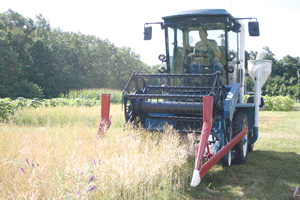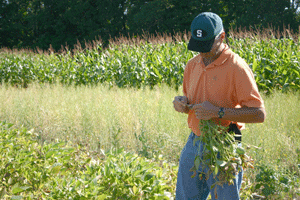MSU researchers grow green at brownfield site



November 10, 2006
Researchers in Michigan are researching the possibility of growing green crops on brownfield sites. Soybeans, canola and sunflowers for biodiesel production, as well as corn and switchgrass for ethanol production, were planted this year on a two-acre former industrial dump site in Oakland County, Mich., according to Kurt Thelen, associate professor and extension specialist for Michigan State University (MSU).
The idea behind the three-year study is that land not fit for growing crops for human consumption could be used to grow feedstocks for biofuels. The first objective of the study is to see if it is possible-logistically and economically-to produce quality crops with good yields at former industrial sites, Thelen said. Secondly, researchers will scrutinize quality to make sure the biofuels produced would meet national standards.
A third objective will be to look into whether planting crops on brownfield sites offers any bioremediation, or cleans up the soil, he said. That won't be the main objective, however.
The idea for the study came out of DaimlerChrysler's work on biodiesel standards, particularly for B20, according to Jim Croce, CEO of NextEnergy, a nonprofit corporation that is concentrating its efforts toward accelerating the development of Michigan's alternative energy industry. DaimlerChrysler came to NextEnergy with the idea for crop production on old industrial sites, and NextEnergy connected the company with MSU. "We need to be exploring alternatives for food-grade crops, and this is just one way to do it," Croce says.
DaimlerChrysler provided the land and installed a deer fence around the crops, according to Max Gates, spokesman for DaimlerChrysler. The company's interest in this and other biodiesel projects stems from the automaker's belief that there's a potential to sell more diesel-powered vehicles in the United States. Consequently, the company also believes it's important to maximize the energy and environmental benefits of diesel fuel by promoting increased use of biodiesel, Gates said.
At this point, biofuels crop production is not competing negatively with food production, Gates said. However, as biofuels production expands, it's important to find more efficient crop production methods. Michigan has approximately 500 brownfield sites, Thelen said. About 300 of those sites could be used to grow crops.
The study is supported by DaimlerChrysler, NextEnergy and Project GREEEN (Generating Research and Extension to meet Economic and Environmental Needs). MSU's Michigan Agricultural Experiment Station is also involved.
The idea behind the three-year study is that land not fit for growing crops for human consumption could be used to grow feedstocks for biofuels. The first objective of the study is to see if it is possible-logistically and economically-to produce quality crops with good yields at former industrial sites, Thelen said. Secondly, researchers will scrutinize quality to make sure the biofuels produced would meet national standards.
A third objective will be to look into whether planting crops on brownfield sites offers any bioremediation, or cleans up the soil, he said. That won't be the main objective, however.
The idea for the study came out of DaimlerChrysler's work on biodiesel standards, particularly for B20, according to Jim Croce, CEO of NextEnergy, a nonprofit corporation that is concentrating its efforts toward accelerating the development of Michigan's alternative energy industry. DaimlerChrysler came to NextEnergy with the idea for crop production on old industrial sites, and NextEnergy connected the company with MSU. "We need to be exploring alternatives for food-grade crops, and this is just one way to do it," Croce says.
DaimlerChrysler provided the land and installed a deer fence around the crops, according to Max Gates, spokesman for DaimlerChrysler. The company's interest in this and other biodiesel projects stems from the automaker's belief that there's a potential to sell more diesel-powered vehicles in the United States. Consequently, the company also believes it's important to maximize the energy and environmental benefits of diesel fuel by promoting increased use of biodiesel, Gates said.
At this point, biofuels crop production is not competing negatively with food production, Gates said. However, as biofuels production expands, it's important to find more efficient crop production methods. Michigan has approximately 500 brownfield sites, Thelen said. About 300 of those sites could be used to grow crops.
The study is supported by DaimlerChrysler, NextEnergy and Project GREEEN (Generating Research and Extension to meet Economic and Environmental Needs). MSU's Michigan Agricultural Experiment Station is also involved.
Advertisement
Advertisement
Upcoming Events





